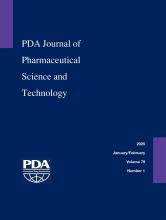Abstract
Ethylene oxide (ETO) is commonly used to sterilize plastic containers, but the effects of residual amounts left after sterilization on protein therapeutics are still not well understood. Here we focus primarily on the factors that influence concentrations of ETO migrating from ETO-treated plastic containers. A study was designed to investigate the kinetics of this process at various temperatures, and the kinetic data could be fit with a model based on a combination of Fickean diffusion and first order chemical reaction (to account for observed hydrolysis of ETO). The diffusion and reaction rate constants thus obtained obey Arrhenius-like temperature dependence. These results indicate that even with the use of an effective extraction protocol and sensitive analytical method, measurements of residual ETO in a container must account for the effects of ETO hydrolysis. Further, the effects of salt concentration and pH of the fluid in the container on accumulated ETO levels were explored. Finally, interactions of ETO with anti-streptavidin (AntiSA) IgG1 and IgG2 antibodies were studied, with ETO adducts found on all methionine residues when incubated in solutions spiked with ETO at concentrations that could be reached (based on the kinetic studies) in ETO-treated plastic vials. Overall, the likelihood of observable ETO-protein modifications upon storage in ETO-sterilized containers will depend on a complex interplay of protein properties, formulation details, storage conditions, and amount of residual ETO initially in the container.
- Received September 16, 2015.
- Accepted July 27, 2016.
- Copyright © 2016, Parenteral Drug Association
PDA members receive access to all articles published in the current year and previous volume year. Institutional subscribers received access to all content. Log in below to receive access to this article if you are either of these.
If you are neither or you are a PDA member trying to access an article outside of your membership license, then you must purchase access to this article (below). If you do not have a username or password for JPST, you will be required to create an account prior to purchasing.
Full issue PDFs are for PDA members only.
Note to pda.org users
The PDA and PDA bookstore websites (www.pda.org and www.pda.org/bookstore) are separate websites from the PDA JPST website. When you first join PDA, your initial UserID and Password are sent to HighWirePress to create your PDA JPST account. Subsequent UserrID and Password changes required at the PDA websites will not pass on to PDA JPST and vice versa. If you forget your PDA JPST UserID and/or Password, you can request help to retrieve UserID and reset Password below.






